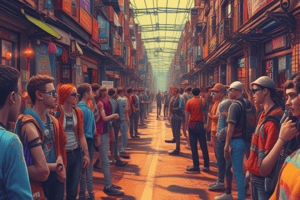Podcast
Questions and Answers
What is the main argument of subcultural theory?
What is the main argument of subcultural theory?
- All societies have the same values.
- Delinquency is primarily caused by economic inequality.
- Certain groups form and develop their own set of norms and values. (correct)
- Only upper class males form deviant subcultures.
Who argues that the police may have a 'canteen culture'?
Who argues that the police may have a 'canteen culture'?
Reiner
What do middle-class children use to negotiate or intimidate police officers?
What do middle-class children use to negotiate or intimidate police officers?
- Cultural capital (correct)
- Street code
- Elaborated code (correct)
- Restricted code
Feminists support subcultural theory without reservations.
Feminists support subcultural theory without reservations.
What does Cohen suggest leads to 'status frustration' among lower-class boys?
What does Cohen suggest leads to 'status frustration' among lower-class boys?
According to the criticisms of Cohen, how likely is it that boys consciously identified and subverted middle-class values?
According to the criticisms of Cohen, how likely is it that boys consciously identified and subverted middle-class values?
Who studied 'the lads' and their reaction to academic failure?
Who studied 'the lads' and their reaction to academic failure?
What unique contribution did Cloward and Ohlin make to subcultural theory?
What unique contribution did Cloward and Ohlin make to subcultural theory?
Flashcards are hidden until you start studying
Study Notes
Subcultural Theory Overview
- Subcultural theory posits that certain groups develop distinct norms and values contrasting with mainstream society.
- It explains higher delinquency rates among working-class males as a response to societal issues not encountered by others.
- The theory suggests that these subcultures arise due to societal pressures and frustrations experienced by particular groups.
Support for Subcultural Theory
- Reiner highlights 'canteen culture' within police forces, suggesting a macho and homogeneous mindset that leads to biased targeting of specific groups, especially ethnic minorities.
- Bernstein points out that middle-class children use an 'elaborated code' which helps them navigate legal situations, leading to disparities in punishment frequency seen in working-class subcultures.
Criticisms of Subcultural Theory
- Reiner argues that police culture influences deviance more than subcultural factors.
- Feminists criticize the theory for being gender-biased, overlooking women's experiences and perspectives.
- Marxists believe the theory ignores broader class oppression and inequalities.
- Matzas emphasizes a lack of distinctive values among working-class youth.
- Donnes claims young, working-class males often reflect a dissociation from mainstream societal values instead of adhering to a unique subculture.
Cohen's Delinquent Subculture
- Albert Cohen focuses on working-class crime, highlighting that delinquency is often driven by thrill rather than financial gain.
- Cohen describes 'status frustration' as a reaction of lower-class boys who fail to achieve middle-class aspirations, leading them to invert accepted values through delinquent behavior.
- Schools serve as critical settings for this frustration, often reinforcing feelings of inadequacy.
Criticisms of Cohen's Theory
- Critics argue that it is unrealistic to assume boys consciously identify and reject middle-class values.
Support for Cohen's Theory
- Paul Willis's study of 'the lads' illustrates that boys recognized their inevitable academic failure, leading to rejection of school authority and rules as a coping mechanism, aligning with Cohen's ideas regarding lower-class males and their social behaviors.
Cloward and Ohlin's Opportunity Structures
- Cloward and Ohlin expanded on Merton's strain theory, introducing the concepts of legitimate and illegitimate opportunity structures.
- They identified three main adaptations within subcultures:
- Criminal subculture: includes established successful role models in local crime.
- Conflict subculture: centered around violence and aggression; lacks cohesive organization.
- Retreatist subculture: comprised of individuals who resort to drug use and escapism, often failing in both legitimate and illegitimate avenues.
Studying That Suits You
Use AI to generate personalized quizzes and flashcards to suit your learning preferences.



